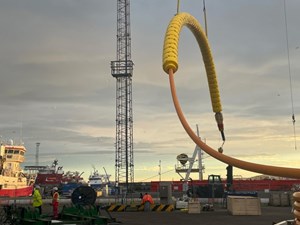Strohm fast-tracks delivery of TCP Riser for Shell’s North Sea operations
Strohm has supplied Shell with a static Thermoplastic Composite (TCP) Riser to support operations at one of its Southern North Sea assets. The availability of TCP through Strohm’s “TCP on Demand” model and the ability to install end-fittings offshore enabled flexible, quick and easy installation.
Strohm was able to offer a fast-track delivery (January ’22) of their 2.0-inch 10ksi stock product, including all ancillaries, to support Shell’s tight schedule.
In a mature basin such as the North Sea, the pipeline infrastructure is ageing and, in some cases, pipelines need replacement. For such a situation, TCP is an attractive solution. In this case for Shell, the TCP could be terminated above the J-tube, allowing for a smaller existing J-tube to be used, avoiding the need for any welding or curing. Strohm, together with their trusted partners, included a fast-track supply of the J-tube bellmouth, centralizer, bend restrictors, hang-off clamps, providing a full solution with a quick turnaround.
Strohm has the largest track record for the production and delivery of TCP. It is a strong, corrosion resistant composite pipe solution with a long, maintenance free service life. TCP is spoolable and delivered in long lengths allowing operators to use existing field support vessels on long-term charter rather than mobilising dedicated pipelay assets, making significant efficiencies and supporting lower carbon emissions targets. TCP has a 100% track record of no failures on installed pipe.
The technology is increasingly being considered in the renewables sector, including offshore hydrogen and carbon capture and storage, as well as in conventional oil and gas applications. The project for Shell saw the technology being delivered on a subsea pallet.
As well as passing on cost savings for the fully installed package, in parallel, TCP also allows clients to reduce their own C02 emissions whilst contributing to an overall reduction in C02 footprint. DNV has conducted an in-depth analysis of the CO2 footprint related to the manufacture and installation of a TCP Flowline and found that it results in a 50+% reduction compared to that of a steel alternative. The company is continuing this work to assess the operational life, including assessing the impact of the non-corrosive nature of TCP which negates the need for any injection of chemicals related to inspection and pigging.



